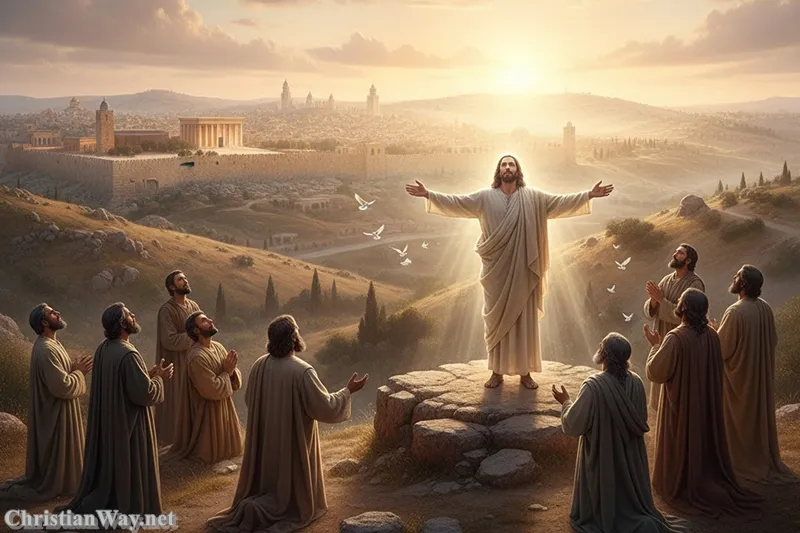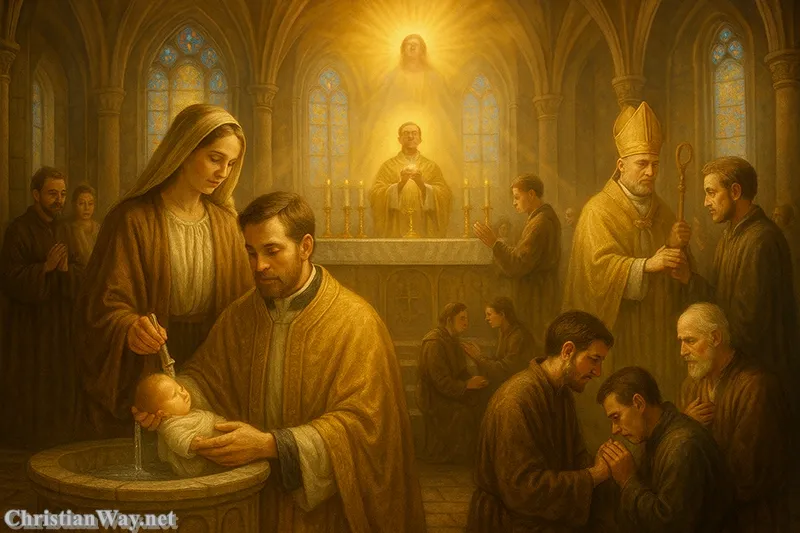Dear friends in Christ,
Among the Twelve Apostles chosen by Jesus, few are as mysterious and quietly compelling as Saint Simon the Zealot. His name itself speaks of passion — zeal, that burning fire of conviction and love that moves a person to give all for the sake of God. Yet, Scripture tells us very little about his life. He appears briefly in the Gospel lists, called “Simon the Zealot” or “Simon the Cananaean,” but almost nothing else is said. Still, within those few words lies a profound story of transformation: a man once marked by earthly zeal became, by grace, an Apostle of divine zeal — one who carried the Gospel with courage and unwavering mission to the ends of the earth.

Saint Simon’s life, though veiled in silence, invites every Christian to reflect on what true zeal means — not the restless passion that burns out, but the holy flame kindled by the Spirit, which consumes sin and lights the world with faith.
The Meaning of His Name: “Simon the Zealot”
The title “Zealot” offers the first clue to the soul of this Apostle. In the time of Christ, the Zealots were a group of fervent Jews who longed for the liberation of Israel from Roman rule. They were known for their intense nationalistic spirit, and some among them even resorted to violence, believing it was the will of God to free their people through force.
Simon’s association with this group suggests that before meeting Jesus, he may have been deeply committed to the cause of national freedom — a man of fiery temperament, passionate for justice, and impatient for action. The Gospel of Luke calls him “Simon called the Zealot” (Luke 6:15), while Matthew and Mark refer to him as “Simon the Cananaean” (Matthew 10:4; Mark 3:18), which likely comes from the Aramaic word qan’an, meaning “zealous.”
Whatever his background, one truth shines clearly: when Simon met Christ, his human zeal was transformed into holy zeal — no longer directed toward earthly revolution, but toward the spiritual liberation of souls.
From Political Passion to Apostolic Fire
To follow Jesus meant a radical conversion of heart. Simon’s former longing for earthly freedom found its true fulfillment in the Kingdom of God. Where once he may have dreamed of overthrowing Rome, he now sought to conquer hearts for Christ.
It is a striking reminder that God does not erase our human passions — He redeems them. The same intensity that once burned for an earthly cause became, in Simon, the zeal of a missionary disciple. The Gospel transformed his anger into compassion, his fervor into faith, and his desire for justice into a longing for the salvation of all.
Saint Paul, once a persecutor of Christians, underwent a similar transformation. His zeal, purified by grace, became the instrument of divine love. In this, we see the same pattern repeated: God takes our fire and makes it holy.
As Saint Augustine beautifully wrote, “Zeal is love that burns. But if it burns for oneself, it destroys; if it burns for God, it saves.”
Simon Among the Twelve
The New Testament lists Simon the Zealot alongside the other Apostles, often near Judas Thaddeus (St. Jude). The two are often paired in both Scripture and tradition. After Pentecost, ancient sources tell us they journeyed together on mission, preaching the Gospel across distant lands.
Simon’s inclusion among the Twelve speaks of the diversity of those Christ called. Among the fishermen, tax collectors, and scholars, Simon stands as the man of passion — one whose zeal, once earthly, became sanctified. It reminds us that Christ’s Church is not built on sameness but on unity in diversity. Each Apostle, with his distinct story and temperament, reflects a facet of the Lord’s redeeming love.
Just as Peter’s courage, John’s love, and Thomas’s inquiry were all purified by Christ, so Simon’s zeal was transformed into a divine instrument for evangelization.
The Missionary Journeys of Saint Simon the Zealot
While the New Testament gives no record of Simon’s later life, Christian tradition — from both East and West — preserves various accounts of his missionary labors. Though the details differ, they agree on one central truth: Simon carried the Gospel far beyond Judea, preaching to peoples who had never heard the name of Jesus.
According to some traditions, Saint Simon evangelized in Egypt and North Africa; others say he traveled through Persia, Armenia, and Syria, often alongside Saint Jude Thaddeus. In these lands, he endured persecution and hardship, facing the hostility of pagan rulers and the dangers of distant travel.
One ancient story tells that Simon and Jude suffered martyrdom together in Persia, bearing witness to Christ until their final breath. The Roman Martyrology commemorates them jointly on October 28, honoring their united zeal and missionary spirit.
Whether in Egypt, Mesopotamia, or Persia, the heart of the story remains the same: Simon’s zeal was spent not in anger, but in love — a love willing to die for the truth.
The Zeal That Burns with Love
What, then, is holy zeal?
It is not frenzy, nor blind activism, nor the pride of thinking we must save the world by our strength. Holy zeal is love on fire — love that cannot remain silent when souls are in need, when truth is obscured, when injustice wounds the human heart.
Saint Simon shows us that zeal is sanctified when it becomes patient, when it listens to God before speaking, and when it acts not from self-will but from divine inspiration.
Jesus Himself was consumed with such zeal: “Zeal for Your house will consume me” (John 2:17). His was the zeal that cleansed the Temple, healed the sick, and endured the Cross — not out of rage, but out of perfect love.
Simon learned this from the Master. He who once might have carried a sword for Israel came to carry the sword of the Spirit — the Word of God. He fought not against flesh and blood, but against the powers of darkness (Ephesians 6:12). His zeal became that of a true disciple: courageous, faithful, and rooted in charity.
Lessons from Saint Simon for Today’s Disciples
In every generation, the Church needs zeal — not the reckless kind, but the sanctified fire that comes from the Holy Spirit.
We live in a time when many grow indifferent to God, when faith seems to fade amid comfort or confusion. Yet the Gospel calls us, as it called Simon, to rekindle the fire of conviction, to be missionaries in our own world.
1. Zeal Must Begin in the Heart
True zeal is born in prayer. It begins not with plans or movements, but with conversion. Like Simon, we must first allow Christ to purify our inner passion, lest we fight for our own glory instead of His. The saints remind us that every mission begins in the silence of adoration.
2. Zeal Must Be Guided by Charity
Saint Simon’s example warns us that zeal without love becomes harsh and destructive. We must let our passion for truth be clothed in gentleness and mercy. To be zealous for God means to desire the salvation of all, even those who oppose us.
3. Zeal Must Lead to Mission
Faith is not meant to be hidden. Simon’s zeal carried him across deserts and kingdoms, to peoples unknown. Today, that same zeal must move us beyond comfort and indifference — into acts of mercy, evangelization, and witness. Whether by words, service, or silent prayer, every Christian is called to be an apostle.
The Church Remembers Saint Simon the Zealot
The liturgical memory of Saint Simon, celebrated with Saint Jude on October 28, invites the faithful to renew their missionary spirit. Together, these Apostles remind us that the Gospel spread not through power or wealth, but through the courage of hearts set ablaze by God.
In art, Simon is often depicted holding a saw, symbolizing the instrument of his martyrdom — a reminder of his total fidelity to Christ. His relics, according to some traditions, rest in St. Peter’s Basilica in Rome, near those of his fellow Apostles, as a silent testimony to their unity in mission.
Across the Christian world — Catholic, Orthodox, and Protestant alike — Saint Simon stands as a symbol of missionary zeal purified by grace. He represents the conversion of human passion into divine love, a theme that transcends denominational lines and speaks to the heart of every believer.
The Zeal of the Saints and the Zeal of the Church
When we look upon the lives of the saints, we find that each possessed a measure of Simon’s zeal. Saint Francis of Assisi, aflame with love, cried out, “Love is not loved!” Saint Catherine of Siena declared, “Be who God meant you to be, and you will set the world on fire.”
This same spirit burns in the Church today — in missionaries who serve in distant lands, in parents who raise their children in faith, in the quiet witness of those who forgive and persevere. Each, in their own way, shares the zeal of Simon the Apostle.
For zeal is not confined to the dramatic or the visible. It is often hidden in fidelity, patience, and the daily offering of one’s life for God. The missionary spirit is not a matter of distance, but of love — love that seeks to make Christ known wherever we are.
A Zeal That Transforms the World
The world hungers for witnesses who believe with conviction, who live with integrity, who love with passion. Saint Simon the Zealot calls us to such faith — a faith that is alive, ardent, and courageous.
We need this kind of zeal today: not to fight for earthly kingdoms, but to bear the fire of the Kingdom of God. When the Holy Spirit fills our hearts, we too become apostles — men and women whose love becomes a mission.
As Pope Francis often reminds us, “The missionary disciple is not someone who has everything figured out, but someone who has been seized by the love of Christ.” Simon was seized by that love, and it carried him to martyrdom.
May his example stir within us the same holy urgency — to live the Gospel without fear, to serve without hesitation, and to love without limits.
Reflect and Pray
Dear brothers and sisters, the story of Saint Simon the Zealot is not merely ancient history. It is a mirror for our own hearts. Each of us carries a zeal — for truth, for justice, for purpose. The question is: have we let Christ transform it?
Let us pray that our passions may become instruments of His love, that our energy may serve His mission, and that our lives, like Simon’s, may become flames of faith in a world that so often grows cold.
Prayer:
Lord Jesus, You chose Saint Simon the Zealot, a man of fervent heart, and transformed his human passion into divine love.
Teach us to burn with holy zeal — not for ourselves, but for Your Kingdom.
May we serve You with courage, patience, and joy, bringing Your light to every corner of the world.
Strengthen in us the missionary spirit that sent Simon to the nations,
and grant that we may remain faithful to You in all things.
Amen.
May the zeal of Saint Simon inspire your heart to love Christ without reserve and to live your mission with joy.
— Fr. John Matthew, for Christian Way





